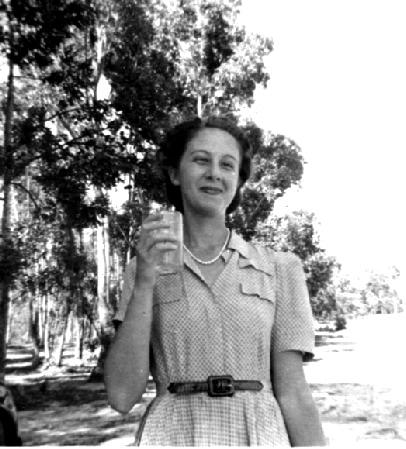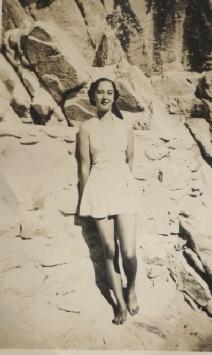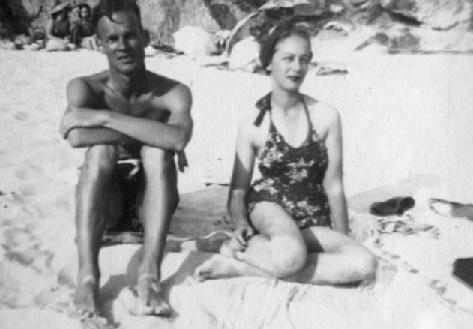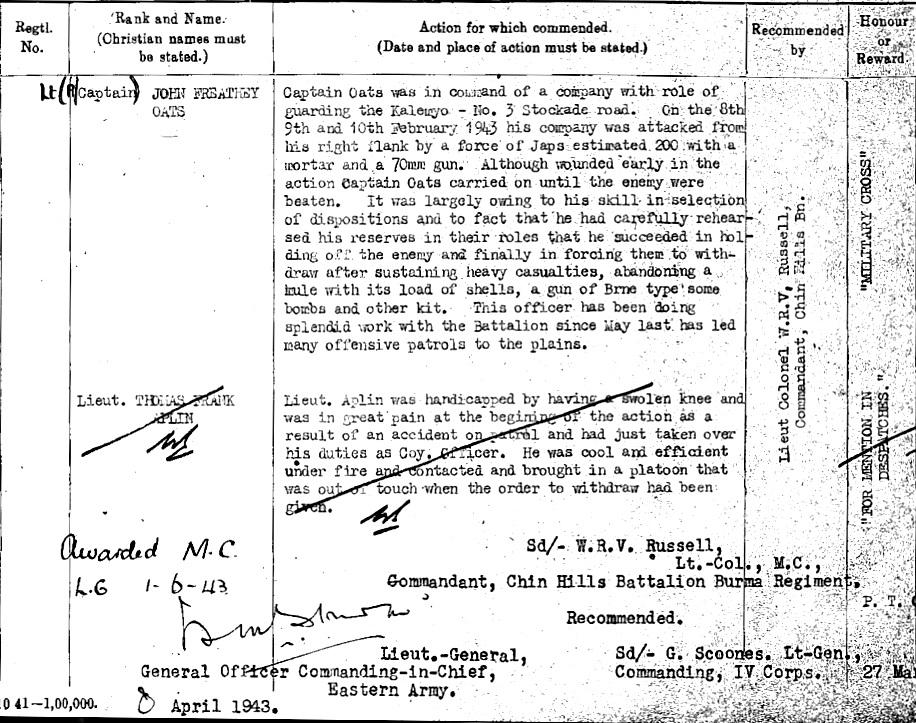
Disclaimer: Any views expressed by individuals and organisations are their own and do not in any way represent the views of The Heritage Portal. If you find any mistakes or historical inaccuracies, please contact the editor.
Among the finished compositions that Berdine Luyt left in her papers is a file titled “Letters from Hermanus: 1942-1945”. The file contains 36 lengthy letters from Berdine Luyt, the eldest daughter of P John and Joey van Rhyn Luyt, owners of the Marine Hotel, Hermanus (hotel pictured above). Many servicemen stayed at the hotel while on shore leave from Cape Town and the Luyts (two other daughters were also involved in running the hotel) went way out of their way to entertain the men. As Berdine wrote in her diary: “…it was often the last good time they would see on this earth”.
The letters are addressed to a member of the armed forces referred to only as ‘John’. There are no letters surviving from John to Berdine, though in the text of her letters she refers to receiving only seven from him during this period. At one point, she goes so far as to complain jokingly that “‘Love to Berdine’ in other people’s cables will not do.”
Berdine Luyt is one of the unsung characters in the history of Hermanus. As well as spending all her school holidays helping out in the hotel, she came to work there on a full-time basis when she left school in 1934 and remained there until the hotel was sold in 1947. She then left Hermanus for 23 years, returning only in 1970 to stay with her mother. Between 1970 and 1973 she wrote three book-length accounts of life in Hermanus in the period 1904 to 1973. The first was her mother’s memories of her ancestors and her life in Hermanus, covering a period from about 1900 to 1940, which has been published by the Hermanus History Society as “In Those Days: The Story of Joey Luyt and the Marine Hotel, Hermanus”, edited by the present writer.
Young Joey Luyt
Her second account has also been published by the History Society as “Luyt’s Marine: A Diary of the years 1942 to 1947”. This is a detailed reflection of a small town responding to the pressures of World War II and was entirely Berdine’s own perspective. This was also edited by the present writer. Her third account, not yet published, involves the hilarious mismanagement of the Marine Hotel when she was persuaded to work there between 1970 and 1973 when it was owned by W.H Hinder, then also owner of Arthur’s Seat Hotel in Sea Point, Cape Town.
Berdine in 1945
The incident in her life that is recounted here occurred in 1942 and 1943. During the War literally hundreds of servicemen stayed at the Marine while on leave or recuperating from injury. Berdine took many ‘happy snaps’ of young men staying there and sent these to their families, together with, she is careful to say, the negatives, so that the family could make more prints. The letters were followed by food parcels personally bought and individually packed by members of the Luyt family. I have in my possession many letters of grateful thanks from families, mainly in the United Kingdom. On several occasions, parents or wives wrote to tell the Luyts that they had received notification of the death of the loved one involved before the Luyt’s letter arrived and that the Luyt’s letter and photographs were the most recent they would ever have.
Berdine on the Beach in 1943
Berdine and a relative in the 1940s
Berdine was also a prolific letter writer and the letters to “John” are among many she left. The letters to John are friendly, rather than romantic in tone and much of the contents is descriptions Berdine wrote of happenings at the Marine Hotel and in Hermanus, which also appear in her Diary for the war years. However, a paragraph in the Diary shows that Berdine had strong personal feelings for John:
And I in particular remember John, who came safely through Dunkirk with the Grenadier Guards; came through an adventure in the Balkans, where he had been dropped by parachute and which earned him the M.C.; survived further adventures in Europe and the desert as an officer in the Reconnaissance Corps, acquiring the D.S.O.; a further hectic time in Italy with the Commandos, giving him the Bar to his D.S.O.; who then joined the Paratroopers and was last heard of in Malaya. Laughing, gay, adventurous, so vibrantly alive – Dear John! I cannot believe he is dead.
I became interested in discovering the identity of ‘John’. He is not mentioned in Joey Luyt’s Memoirs, nor in any other writings by Berdine. No one in the family can identify him. However, going through the hundreds of photographs Berdine left, I came across two in each of which there appears a tall young man identified as “John Oates”. I decided to begin my search there.
The single paragraph written by Berdine about John is virtually the service history of an individual, but not a South African. The branches of service mentioned are all British. I then began a systematic search through the records of these regiments. Luckily, the records are almost all digitised and can be searched electronically. Also, the website managers responded to questions.
I decided that the best approach was to search for servicemen with a service history like John’s and who had been decorated as Berdine itemises. The number of Military Crosses was bound to be fewer than the total strength of the Grenadier Guards during World War II. It turned out that Berdine has the sequence of medals awarded a little wrong. John received his MC in 1943 for his service in Malaya, not the Balkans. However, there was enough data for me to be pretty sure that I had identified the correct person. The citations for the medals gave me a middle name which is very uncommon: “Freathey”. The full name opened all sorts of doors, as all other men named “John Oates”, without the middle name, were automatically excluded. The following biography has been put together from the references I was able to identify.
John Frethey (Jack) Oats (note spelling of surname: not Oates) was born in about 1915 in Penzance, Cornwall and was educated at Sherburne School, leaving there in 1931. This school is a well-known public (i.e. private) school in Dorset in the UK and ‘old boys’ include Alan Turing (who broke the Enigma Code), John le Carré (the novelist) and King Mswati of Swaziland. After school Oats studied forestry in Sweden before joining the Grenadier Guards in 1937 as a career soldier. This explains his presence at Dunkirk, as the British had committed mainly professional soldiers to the Expeditionary Force that attempted to stop the German advance into France in 1940.
I cannot confirm all the theatres of war he served in, but he is mentioned in despatches nine times and certainly served in Egypt and Italy. He was regularly promoted, first to Lieutenant and then to acting Captain, both in 1942, and to Major in 1943. The award of his MC was gazetted in April 1943. He was definitely in Burma then, serving in what was known as the Army in Burma: Reserve Officers (ABRO). This was the training wing of the British forces, developing Burmese officers for jungle fighting against the Japanese. Those who passed the training constituted the famous Chindits, though John himself did not serve with them.
By the end of the War, Berdine had not heard from or about him and seems to have reconciled herself to the fact that he had been killed in action. However, this is not the case. John Oats is mentioned several times in an account of the war in Burma entitled “Distinctly, I Remember” by Harold Braund. The key quotation, which can be dated by the reference to the surrender of Italy (8 September 1943) reads as follows:
"I (Braund) arrived at my new HQ in time to put down a rum ration that had arrived simultaneously with Italy's surrender. Among those present was Jack Oats, whom I was delighted to see; but when I saw him off a day or two later it was to be my last view of him as an able-bodied man. In a tragic jeep accident in Shillong while he was on leave, his back was broken and he was crippled for life. Jack of all people."
Jack disappears for some time, presumably in hospital and convalescing from his injury. But in a 1960s travel book John Oats is mentioned as resident in Portugal, having taken a law degree and earning a living teaching English as a second language. It is specifically mentioned that he is confined to a wheelchair. I have been unable as yet to trace the date and place of his death, though there are indications that he lived into the 1980s. Berdine herself died from cancer in 1980.
This is the text of the recommendation supporting Oats’ Military Cross:
Captain Oats was in command of a company with role of guarding the Kelemyo – No. 3 Stockade Road. On the 8th, 9th and 10th February his company was attacked from his right flank by a force of Japs estimated 200 with a mortar and a 70mm gun. Although wounded early in the action, Captain Oats carried on till the enemy were beaten. It was largely owing to his skill in selection of dispositions and the fact that he had carefully rehearsed his reserves in their roles that he succeeded in holding off the enemy and finally forcing them to withdraw after sustaining heavy casualties, abandoning a kule with its load of shells, a gun of the Bren type, some bombs and other kit. This officer has been doing splendid work with the Battalion since May last. (He) has led many offensive patrols to the plains. [I have been unable to find out what a ‘kule’ is.]
Recommendation supporting Oats’ Military Cross
In the 1940s it was obviously difficult to obtain military information, initially for security reasons and later because of the sheer volume of desperate enquiries received by the military from family members searching for their missing relatives. There is no record of Berdine Luyt initiating any search for John Oats. It would have been quite usual simply to accept that, as he did not get in touch, he had been captured or killed. In light of our knowledge now her last sentence can be read either as “I cannot accept the news that he is dead” or “I cannot accept the fact that he may be dead”.
From John Oats’ side we can only speculate. From the start, it seems that he took the relationship less seriously than Berdine did and he could easily have forgotten her, given the trauma he suffered. It is easy also to infer that, after a really distinguished fighting career, he was distressed that he had been removed from the War by a simple motor accident, rather than wounded in action, and did not wish to share that information with her.
I know nothing of other relationships in John Oats’ life, but I do know something from the fact that my own father suffered a broken back while travelling in a personnel carrier that hit a mine in North Africa, also in 1943. He spent three years in plaster from his neck to his knees in the Military Hospital in Cairo and was confined to a wheelchair for the rest of his life. He died in 1976. He was not forthcoming to anyone about the cause of his injury and, in fact did not willingly speak of the War to anyone. Maybe John Oats did not feel he could burden a holiday acquaintance with the news that he would be an invalid for the rest of his life.
On the other hand, I feel quite sure that Berdine would have gone to him as soon as possible if she had known he was alive. And there would have been few women as likely to stand by him and help to carry his burden as the highly organised and optimistic young lady from the Marine Hotel, Hermanus.
Comments will load below. If for any reason none appear click here for some troubleshooting tips. If you would like to post a comment and need instructions click here.





